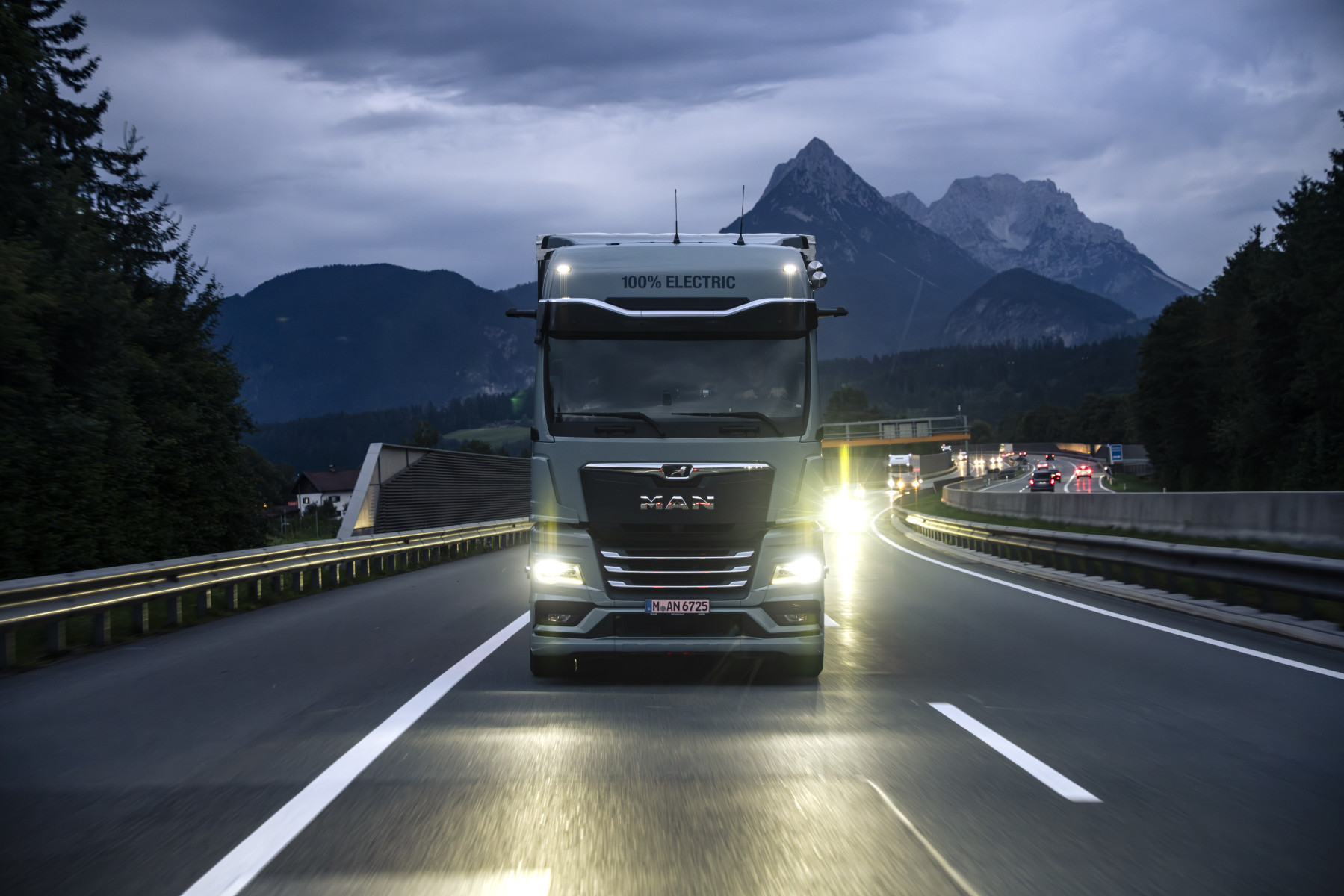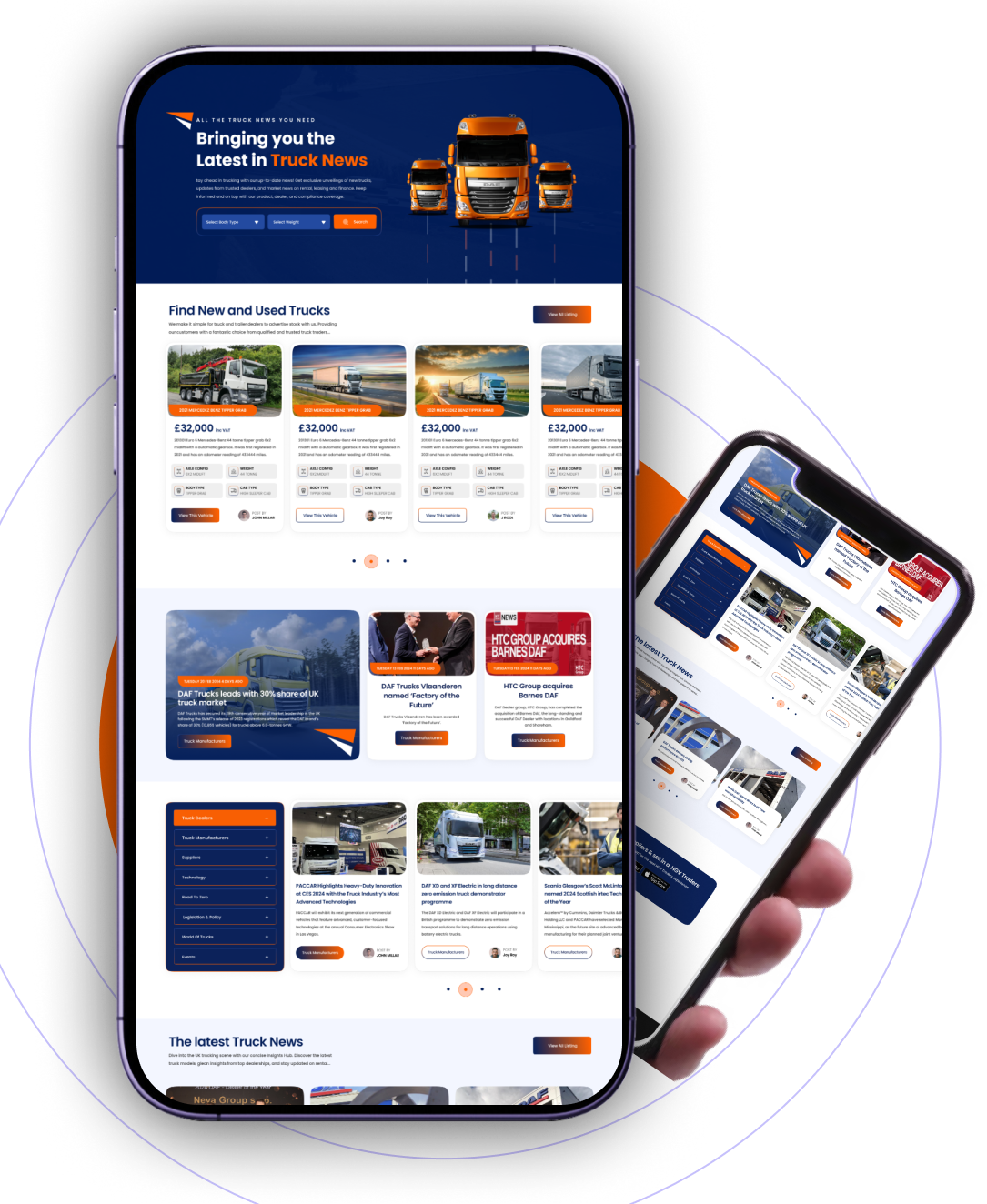M
By John Millar
Posted 6 months ago
Across the Brenner Pass at night with the MAN eTruck
MAN Truck & Bus and the Dettendorfer freight forwarding company are testing the night-time use of fully electric trucks on a Brenner route between Raubling and Bolzano for four weeks in July and August as part of a pilot project.

- MAN and Dettendorfer demonstrate emission-free night-time logistics across the Brenner Pass in a pilot project
- Four-week trial run with the MAN eTruck between Raubling and Bolzano – eTruck benefits from exemption from night-time driving ban
- Around 95 tonnes of CO₂ savings per vehicle per year in daily use and up to 40 percent recuperation on the Brenner route
- Annual toll savings of over €60,000 for electric trucks on the Brenner route – total cost advantage of 15 per cent
- Significant reduction in noise emissions in the Inn Valley and at the Brenner Pass
- Bavarian Transport Minister Bernreiter: “Strong signal for green corridors on Europe's most important motorways”
Thanks to the existing exemption from the night-time driving ban on the A12 (Inntal motorway), eTrucks are allowed to drive at night, unlike diesel trucks. The aim of the project is to ease traffic flows on the Brenner Pass, avoid congestion, reduce CO2 and noise emissions, and increase security of supply – especially during the holiday season.
“E-trucks can be an important part of the solution for Alpine freight transport on the Brenner route. If we take the transport transition seriously, we must also make road freight transport more sustainable. The night-time use of e-trucks shows that less CO₂, less noise and better use of infrastructure are possible. This is an important signal for green commercial vehicle corridors throughout Europe. Now it is important to consistently expand the charging infrastructure across borders,” says Christian Bernreiter, Bavarian Minister of State for Housing, Construction and Transport.
Competitive advantage for freight forwarders – predictable supply chains
Night-time transport with eTrucks across the Brenner Pass has been possible in principle since 2021. However, there has been a lack of widespread vehicle availability and charging infrastructure for long-distance transport. With the MAN eTruck, which has been in series production in Munich since June 2025, daily ranges of up to 800 km can be easily achieved with one intermediate charge in both winter and summer. Thanks to an exemption from the night-time driving ban on the Inntal motorway (A12) in Tyrol, the fully electric truck can operate cross-border at night on the entire route between Germany and Italy – for example, from Munich to Verona or from Rosenheim via the Brenner Pass to Bolzano and back.
This means that eTrucks can now cover routes that were previously impossible for diesel trucks due to night-time driving bans – a real step forward for efficient, quiet and emission-free night-time logistics in the Alpine region and particularly interesting for transport in the refrigerated and pharmaceutical logistics sectors or for time-critical supply chains. In this way, eTrucks relieve the Brenner route during low-traffic night-time hours. A model calculation shows that just 300 eTrucks operating at night can reduce block clearance in Kufstein by up to one hour during the day. At the same time, they make an important contribution to climate protection: each eTruck saves an average of around 95 tonnes of CO₂ per year – with an annual mileage of 110,000 km. With just 300 vehicles per day, this results in annual savings of up to 28,000 tonnes of CO₂, which is equivalent to the emissions of a small town.
“Electric heavy-duty logistics is revolutionising road freight transport – even under the most demanding topographical conditions that prevail in alpine regions. With this project, we are demonstrating that fully electric trucks are not only practical, but also set new standards in efficiency, sustainability and traffic control thanks to features such as recuperation and the possibility of night-time transport. Politics and industry must work hand in hand to make emission-free logistics a reality across the board,” says Dr Frederik Zohm, Executive Board Member for Research & Development at MAN Truck & Bus.
eTrucks on the Brenner Pass: Economical, reducing traffic, protecting the climate
The use of electric trucks on the Brenner route not only makes sense in terms of avoiding traffic jams and congestion, but also from an economic perspective. With an annual mileage of over 110,000 kilometres on German motorways, this results in toll savings of over 60,000 euros per vehicle per year – a clear economic advantage for the use of battery-powered trucks. The 100% toll exemption currently applies exclusively in Germany. EU Transport Commissioner Apostolos Tzitzikostas recently recommended extending the toll reduction for electric trucks, which was previously limited to the end of 2025, until mid-2031. The aim is to increase investment security for logistics companies and accelerate the switch to e-mobility.
Different rules apply in other countries: on the A13 in Austria, e-trucks are charged up to 75 per cent less toll, especially at night. In Italy, on the other hand, there are only marginal differences in tolls between diesel and e-trucks on the route via the Brenner Pass to Bolzano.
Over a period of three years, a typical usage scenario for trucks in logistics, the toll savings of the eTruck contribute to a total cost advantage (total cost of ownership) of over 15 percent compared to diesel-powered vehicles on the Brenner route. In addition to lower tolls, lower energy and maintenance costs, exemption from vehicle tax and the increasingly available charging infrastructure along the route contribute to the economic efficiency. Example charging scenarios show that charging costs around 0.41 euro/kWh at night in Raubling and around 0.38 euro/kWh in Bolzano. In addition, recuperation on the mountainous route increases to up to 40%. While braking energy is lost unused in diesel trucks, the eTruck stores it as electricity back in the battery – a clear efficiency advantage.
Significantly reduced noise pollution – a win for residents and the environment
Battery-powered trucks also significantly reduce noise emissions compared to diesel trucks. In acoustic tests, the eTruck was perceived as around half as loud as a conventional diesel truck when accelerating. Specifically, this results in a difference in noise level of around twelve decibels. This roughly corresponds to the difference between a main road and a quiet street in a residential area. A real benefit for residents and the environment along the Brenner route.
Dettendorfer as a pioneering logistics partner
“For us, it's clear: if we want to make the shift to climate-friendly logistics, we need solutions that work in everyday life – across national borders and without compromising on service,” says Georg Dettendorfer, Managing Director of Spedition Dettendorfer. The family-run Spedition Dettendorfer, based in Raubling, is considered a pioneer in sustainable logistics. As a long-standing innovation partner of MAN, Dettendorfer has been testing alternative drive systems in real-world operations for several years – now for the first time in cross-border night-time operations. Dettendorfer Energy GmbH also plays a central role as a first mover and important partner in the project by setting up a charging infrastructure for freight transport in Upper and Lower Bavaria and Tyrol.




